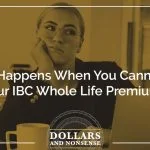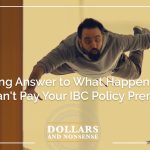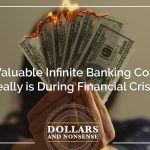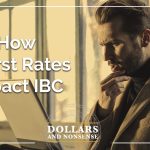In this podcast episode, we discuss what happens to Infinite Banking policies if the dollar collapses or hyperinflation hits. We also discuss what you can do to protect yourself in light of the current global turmoil.
Podcast Topics: Dollar Collapse and Hyperinflation
- How IBC has historically faired during economic turmoil
- The real cost of high inflation periods
- The difference between investments and banking systems
- Dollars, gold, and mediums of exchange
- Why it is best to keep money in motion rather than stagnant
- Infinite banking vs 401Ks in times of financial peril
- The importance of asset diversification and where IBC fits into the strategy
- How mutual life insurance companies are owned by the shareholders
- The 200-year track record of mutual life insurance and how they are different from the rest of the system
Episode Resources:
- Gain access to our Secret Banking Masterclass now FREE to listeners of the podcast here now
- What is Infinite Banking
- Who was Nelson Nash?
- CREDIT: Episode art background photo by Jp Valery
Podcast transcript: Episode 140: What Really Happens to Infinite Banking if the Dollar Collapses or with Hyperinflation
Nate: In this episode, we discuss what happens to Infinite Banking policies if the currency collapses or hyperinflation hits. And also we discuss what you can do to protect yourself in light of the current global turmoil. She’s Holly and she helps people find financial freedom.
Holly: He’s Nate, he makes sense out of money. This is Dollars and Nonsense. If you follow the herd, you will be slaughtered.
Nate: All right, well, welcome back to the show and today’s kind of a dark day in history to some degree. We’re actually recording this podcast on the day that Ukraine is being invaded by Russia. It’s all over the news, I know this will be launched probably where this is in the rear view mirror. So who knows what’s happening when people are actually listening to this show, as you guys know, we do record them in advance. So we’re recording on the day that Ukraine is being invaded by Russia. And that has caused a few questions.
And I actually remember these questions being asked, Holly, if you remember back in like March of 2020, as well. Back when COVID was hitting and the economies were all collapsing, the stock market was going down and everyone was in a panic. And so people are wondering … and very common question that we get. And times like this, when in global turmoil strikes, is what happens in the apocalyptic scenarios? What happens in currency collapses or when hyperinflation hits? We’re already in a very inflationary period. And so they want to know, not only how should they see their policies, are they affected by this type of thing. And kind of what they should be doing in light of the turmoil that’s going on globally. We’re going to try to check a few boxes on this episode of discussing, okay, how does this impact our policies? What should we be doing with policy money in light of this? And kind of where you and I have opinions on the matter to begin with.
Holly: The reality is, you have to think of your policy as a bank. Like we say, it is your bank, it’s the Infinite Banking System, you’ve created a banking system. So if you had money in a bank, would you just leave it sitting there if you really believed the economy was going to collapse? Or would you go and use that money and buy things, in case the economy collapses? Are questions you would be asking, and you and I, we would take money out of our policy, we wouldn’t just be leaving it, sitting there. And we would buy things in case the economy collapsed.
Nate: Yeah, I think for most people, the question is kind of based on the wrong perception. Again, it’s very common to do, so I’m not really calling anybody out, I’m just saying. Really the answer’s going to depend on how the question was posed. Oftentimes it’s like, is Infinite Banking a good idea, considering all of this turmoil and what would happen if we have a crazy hyperinflation, what would happen if we have a currency collapse and the US dollar goes completely away, what’s going to happen in the policies?
As I like to remind people, most of the time that viewpoint is coming from treating the policy as an investment, or as a place just to store money up. They’re like, “Well, if I store it here and the currency collapse. Well, then my dollars in the policy aren’t going to be worth anything.” And so forth. Most answers to all these types of questions just needs a re-centering over what we’re actually trying to do with policies to begin with from day one. The policy is a banking tool.
It would be the same question if they would ask me, “Hey, Nate, should I leave a whole bunch of cash sitting in my bank account if I’m worried about a currency collapse?” Obviously the answer is no. So that’s the same type of thinking though that we want people to see is, if I’m worried about a currency collapse, what are things that I would like to purchase? What are assets I would like to buy in light of global turmoil? Holly and I were talking beforehand, we’re not in the same boat as everybody that are just assuming we’re all doomed in life to begin with. So we may talk about that later, but if you are concerned about it, you need to take steps. And those steps oftentimes would be like buying land, buying farmland, buying guns, precious metals, cryptocurrency.
Holly: Non-perishable food, things that you would purchase or stock up on, water supply, maybe.
Nate: Yeah. Feminine hygiene products.
Holly: There’s all kinds of things. Yeah.
Nate: I mean, all these things are what you would do if you actually believe that the currency is likely to collapse. Or there’s going to be some sort of crazy hyperinflation. Well, that would be our suggestion to you, to you want to do those things? The question is, how are you going to pay for them? Right now, as we stand today, everything has to be purchased here in America with US dollars. You can’t just go take gold to the supermarket and buy food. You have to exchange your US dollars for assets. You’re worried about hyperinflation, you want to go buy some gold. You have to go give the gold guy US dollar in order to get the gold. And then the same thing if you don’t want the gold anymore and you want to go buy some farmland, I don’t know of any farmers right now who are taking gold in exchange for the deed to the farm. What are they taking? They’re taking US dollars. So you got to go sell the gold, get US dollars, go buy the farm.
Right now, banking in the United States is done in US dollars. That’s the way it is right now. You may say that may change someday, but nonetheless, until the data that fully changes, there is no more profitable way to do banking than with policies. So what we would tell you to do is just go use your policy as the bank to go fund the purchases you want to make. And that’s been what we’ve talked about on this podcast for forever. So if you’re worried about hyperinflation, currency collapses, economic turmoil, all those types of things, the policy itself is not supposed to be the asset or the investment that you just store money up in. It’s supposed to be the banking tool.
So just like you wouldn’t leave a whole bunch of cash in a bank account. When you’re worried about those things, you also wouldn’t leave cash sitting in the policy. You’d go use the cash in the policy as a bank to go purchase all of these things that you would want to have in a world where the US dollar does not exist anymore. Which would be a very scary place, you’re going to want a lot of things. And what better way to build up wealth to do that then through financing these investments from policies. That’s actually the whole reason we’re doing it.
So that’s why I say a lot of times these questions of, should I do IBC in light of the peril of the world? I would say, yeah. I mean, right now the US dollars king. It’s still going to be king for the near future. We’re going to do banking with the US dollar. You got to exchange dollars for other goods and services and assets. And this is just the best way to manage banking. So I hope that’s coming across fairly clear.
Holly: And I think too, Nate, you have to remember, remember it’s the Infinite Banking System. But as you borrow that money and you purchase these assets or things you would buy, that money is still growing inside the policy. So that’s why you want to take the money from the policy because it’s still growing. If you’re concerned, buy what you want to buy and use your policy to do it. Don’t take it out of your regular bank account where it didn’t do anything for you. If anything, take it out of the regular bank account and put it into your policy, if you can. And then go buy your assets.
Nate: You want to have multiple assets doing things at the same time, no matter what. So even if we’re in like a hyperinflationary environment, the fact of the matter is the policies will produce more money if you manage your banking transactions from policy. And the flow of money is all coming to and from policies, it’s going to make you more money than if you have money flowing to and from bank accounts. And so even in hyperinflationary environment, the guy who has the most money is still going to win. Nonetheless, banking is a thing, it will always exist.
Now, essentially, if the currency goes down to nothing and it’s completely crashed and there’s a new currency. Well, banking will exist in that currency. And we’ll go start new policies denoted in the new currency. And who knows even what would happen to a policy during a currency crash. Because a new currency would be developed in every asset that is in existence, every contract that is in existence at the time of the old currency, is just going to be repriced into the new currency. So who knows exactly what that would look like in the world of whole life insurance policies.
But nonetheless, we’re trying to create a profitable world to practice banking in. And so kind of the whole point, by the way, of doing IBC is to allow you the freedom and control to no matter what economic environment we find ourselves in, we are always have a whole bunch of money available to us to take advantage of opportunities and to be in control of life. If you compare that to the 401k stuck in the stock market and the currency collapse comes and the entire stock market is wiped out and everything is destroyed and we’re in apocalyptic scenario. You would not have really been able to touch the money in a lot of 401k plans. It would’ve been stuck there. So you just lose everything.
Whereas with the policy, we would have the policy and we’d leverage it and we’d go buy these other things. And then we’d have both. And hopefully, this never has to happen. But nonetheless, the whole point of Infinite Banking is to put you in a position that would be better to stave off that type of environment. Because all of your money is fully liquid without taxation and available to use at any time. That’s kind of where you want to be as you’re preparing for that type of environment. So you can take advantage and buy the assets you need to do quickly, without having to sell stuff and hope that you can get a good price for it at the time and so forth.
Holly: It’s a freedom you have. If you’re concerned about something, think about the questions you would ask. But you want to use that policy for what you’re going to go purchase. It’s the only way to really have a freedom in purchasing it and still making your dollar or whatever currency we’re in now or in the future, do more than one thing.
Nate: So what you can do as we sit right now, I mean, I would continue doing the things that we’ve recommend all along. The philosophy that partners itself with Infant Banking is just taking control of your financial future. So if this is a concern to you, then I would research how you can protect yourself in any sort of economic environment.
So I do own precious metals, I do own some cryptocurrency, I do own some real estate. I would say you want to kind of spread it out. And how am I funding all of that? It’s from policies. That’s where I’ve got all my money flowing to. And that’s where I pull from to go purchase all of these things. If it is a concern to you, which I know it’s a concern to many people, you want to go ahead and continue to do the things that the world would recommend. And I’m not the expert on how to survive a currency crash. But should you own guns? Probably so. Should you own some precious metals, some cryptocurrency, some land, some real estate, some hard assets? Absolutely. The question is, how are you going to buy them?
It’s actually very profitable to own the bank that finances the asset. And so that’s what we’re trying to accomplish here. So that’s what you can do in light of this. Maybe Holly too, we could bring up, in general, a lot of questions that come alongside this are about the stability of the insurance companies. I think it’s always a good reminder to mention the crisis that we’re in right now. Every crisis sounds like a terrible crisis, but in the last 200 years of the mutual life insurance company world, what we’re dealing with now is actually nothing compared to some of the other crises. They’ve already weathered very easily. So I think it’s always good to remember that.
Announcer: Are you still stuck in insecurity and uncertainty? Do you want to feel like a financial genius and confident about your future? Holly and Nate have prepared something exclusively for Dollars and Nonsense listeners. It’s called the Secret Banking Masterclass.
You can gain free access to this course by visiting livingwealth.com/secretbanking. That’s secretbanking, all one word. The course will share with you how the conventional system stacks the deck against you, and exactly how to break free from their system. We believe in challenging the status quo. We believe in defying conventional well tools while maintaining traditional values. After all, most of those conventional tools only ever seem to make someone else on the inner circle rich. Visit livingwealth.com/secretbanking. That’s secretbanking, all one word. Ease your worry and start your journey towards security today. Visit livingwealth.com/secretbanking. Now, back to the great episode with Nate and Holly.
Holly: It’s important to remember that the life insurance companies are not owned by the wealthy, the mutual companies are owned by you, the shareholders. And the other part of that is, it’s dollar for dollar, they don’t do what our banks are doing. They’re not controlled by the Federal Reserve, either. They can’t just loan out money they don’t have. So that’s where the stability comes in. They’re very solid in the money they have and the money they accept, and what they loan out is literally money they have. It’s not something they’ve made out of thin air.
Nate: Yeah, absolutely. And so whenever you think about the economic turmoil that was going on in the 1930s with The Great Depression, I mean every mutual company was still paying dividends through The Great Depression. And that was a years long crisis through World War II, where the entire world was at war. And so then World War II and through World War I. The pandemic we just experienced was nothing compared to the pandemic of what is it? 1918.
We’re always focused on what’s happening here and now and thinking it’s the worst of the worst. Well, the insurance companies and the US dollar, itself, by the way, have weathered far more difficult times than what we’re in today in the grand scheme of things. Now there’s certainly pressures from all sides, but that’s why we ought to be wise with money. And I do believe, and I will always believe that being in control of the banking function in life, presents the ability to weather anything. Because none of your money is locked up in some place that can get pounded by various economic issues. That you have total control of the money to use at any time, to purchase anything you need.
And so, depending on what your vision of the future is, you need to protect yourself in the best way you know possible. So do some research. But the fact that you own the policy is actually a good thing in environments like this. Because it allows us to take advantage of all opportunities by having all the money fully liquid and ready to go, ready to move.
Holly: Like, where Nate’s talking about doing research, too. I mean, we were talking about this earlier, Nate, ask yourself, too, what is the US dollar doing right now? Because it’s not going down, it’s-
Nate: It’s gaining strength.
Holly: Gaining strength-
Nate: Yeah.
Holly: It’s becoming stronger. So if you’re concerned about a dollar collapse, you would see that currency typically losing ground. And it’s not gaining, it’s not as strong, it’s growing weaker and weaker. That currently is not happening with the US dollar. So some of the questions we have or the fears we have, we need to look back and see, what is … or look at what’s happening right now today, in today’s terms, to see what is taking place and what’s happening. Because that US dollar is getting stronger, it’s not getting weaker right now. So the reality is that it is strong right now, it’s not time to panic and be like, “I’m going to liquidate all my money and just buy assets.” And then all you have is assets and no cash.
Nate: I do think some people overdo it in their fears. I would say, don’t let fear drive you, let wisdom be your driver. The wise thing to do is to leave options open, to be flexible, to be in control of money. The worst thing to do in times like this, is give up control of your money to someone else, hoping that they can do something for you in exchange for that. Oftentimes, that is a recipe for disaster.
So all of this to be said, the policies that are supposed to help in this environment, not hurt. So utilize them the way we’ve always been teaching to utilize them. But change your perspective if it needs to be changed. Change your perspective to see the policy as the bank, not the investment. Don’t get caught up in all of the fear that’s being monitored by all sorts of different avenues. While there is certainly a lot of stress and pressure that we ought to be aware of, stay wise, stay confident in all things, trust the Lord.
Holly: You got to have peace. And really your faith and … for us, our faith and our trust is in Christ. And so in that, there is a peace. But you also have to make wise decisions. Don’t be the person that just sat there and waited for somebody else to do something. Do your own research, figure out where you should have some assets building and take it from your policy and do that. So that today and in the future, you’re prepared.
Nate: Absolutely. You’ll be making money in two places. That’s our goal.
I hope this was helpful. It is true that in hyperinflation, the current collapse, the policy itself is not exactly tied to inflation or certain thing. In other words, it is just a banking tool and we ought to use the banking tool to protect ourselves from any sort of event that’s going to happen. Right now, inflation is a huge deal. So what are things that grow during inflationary timeframes?
I would tell you, as I mentioned before, as well, that during inflation, the money starts to get less and less powerful to buy goods and services. However, at the end of the day, the guy with the most money still wins. So using the policy as opposed to a bank account, to finance the things of life is going to result in more money, no matter what. So even if the dollars are weaker in the future, which they will be, no matter what. I still would rather have more of them than less of them. Because then I can buy more assets than the next guy could, and I can achieve more things no matter what happens.
That’s our goal is to become a profitable banker. That’s the whole goal of Infinite Banking. And hopefully by you practicing Infinite Banking, it actually puts you in a better position to weather any sort of financial economic turmoil that comes down the pipeline. Anything else before goes it down, Holly?
Holly: Reach out, ask for help, give us a call. We’ll tell you what we’re doing, what our viewpoint is. And just note, you don’t have to live in fear of what’s happening.
Nate: We’re always happy to help. So, I do worry when people make fear based decisions that are solely based on fear, that can result in poor decision making. While we do need to be aware and concerned about the things that are happening around us and be wise about it. I would say, always try to keep fear at bay as best you can.
Holly: Yeah.
Nate: All right. Well, thanks for joining us for today. This has been Dollars and Nonsense. If you follow the herd, you will get slaughtered.
Holly: For free transcripts and resources, please visit livingwealth.com/e140.
Announcer: Dollars and Nonsense podcast listeners, one more thing before you go. Ease your worry and start your journey towards security today. Visit livingwealth.com/secretbanking. You’ll gain instant free access to the special one hour course Holly and Nate made for you. Again, that’s livingwealth.com/secretbanking.













